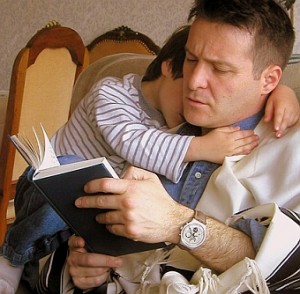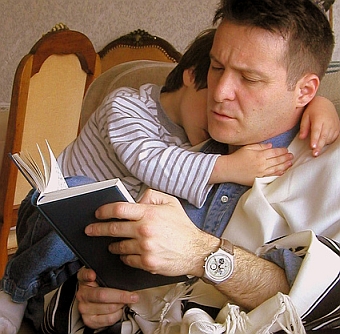 This week, we read about a Commandment to bring the entire nation of Israel together to hear the Torah. “Gather the nation together, the men, the women, the children, and the stranger who is within your gates…” [31:12]
This week, we read about a Commandment to bring the entire nation of Israel together to hear the Torah. “Gather the nation together, the men, the women, the children, and the stranger who is within your gates…” [31:12]
Rabbi Elazar Ben Azaryah asks, why bring the children? And he answers: “In order to give reward to those who bring them.” Even if they don’t understand everything, the children will see how important it is to the parents… And it’s even worth it for the parents to sacrifice. It’s obvious that when children stand there for a period of time, just listening to someone (even the King) read, they’re going to get restless. But that’s worthwhile. It is so important to share with others, even if their understanding is limited, that sometimes it is worth sacrifices of our own. Let them at least see how incredibly important this is to you.
During our own prayers, bringing children before they are ready to understand can be a needless distraction. But at the same time, the older ones should have the opportunity to see how important prayers are, and to involve themselves — especially on the upcoming High Holy Days. The pure prayers of children are a merit to us all.
I should mention that due to the current situation in Israel, with news of possible strikes against a Syrian government equipped with chemical weapons, there is a gathering for women to pray at the Western Wall on Sunday evening, September 1 at 6 PM. And the organizers specifically told people to bring their children to pray with them.
Much of the Jewish community is scratching its collective head, trying to figure out what to do to make prayers on the High Holy Days more interesting and meaningful. This problem begins when people see a Rabbi and Cantor going through the motions — or, if it is clearly more meaningful than that, don’t relate to them. If you see your own father or mother crying during his or her prayers, you can’t help but feel something.
In the absence of those role models, finding deep meaning in the service can’t begin that morning. The days leading up to the Day of Judgment are meant to be days of preparation — the Ashkenazic community begins to say penitential prayers this Motzei Shabbos (Saturday night), while Sepharadim have been saying them all month. We should use this time to study the Siddur and think about what we will be saying — and why we say it.
Wishing everyone an immediate writing and sealing for a year of blessing!





Why ask why do we have to follow G-d’s laws? The question should be why not follow G-d’s laws? After all, He is the source of our strength, He gives us life, He provides for us, what do we do in return for Him? Do we complain that He hasn’t done enough? Do we complain that He allowed some people to die? Those of us who have life should stop to think of all of the good things G-d has done for us and thank Him daily for it. We should be thankful that He loves us enough to give us laws to live by. I am new to the concept, but loving our Heavenly Father has always been a top priority for me. I hope my comments help give someone encouragement and something to think about. He is alive. He is powerful. We must not limit His power by leaning to our own understanding and emotions.
Thanks so much for your article regarding the High Holy Day services and how to make it important for the children. We have a small community led by lay leaders. One of our lay leaders has 3 small children who usually run around in the synagogue, which has caused some irritation for some of the community. On one occasion we had their mother participate in services and surprise surprise, not a peep. They were totally smitten watching her on the bimah. It made it very meaningful for all of us.
We can barely feel in our daily lives how strong or weak is earth gravity, may be when we stumble and fall, we realize it was a few seconds for us to kiss the ground. That same force holds in the vacuum starts, planets, floating in the outmost silence and darkness, some other quite brighter and noisier. Sometimes i feel the presence of g’d weak in my life and because of that I believe mistakenly, that is the actual and real strenght. Thank you for your message of this week and my prayers are with and for israel this week.
shalom, *thank you* The next generation *younglings are the most important* *lots of love* david